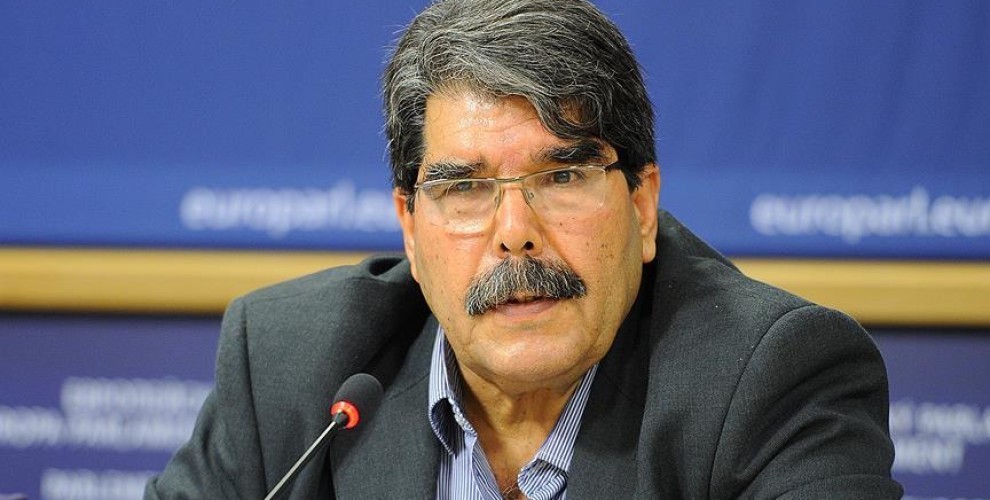Saleh Moslem: The ‘third alternative way’ has proved viable
TEV-DEM executive explains how the Rojava model is working.
TEV-DEM executive explains how the Rojava model is working.

During the internal conflicts ongoing in Syria since March 2011, the Kobanê People's Council took over the administration of Kobanê on 19 July 2012.
That was the spark that opened the way to the Rojava Revolution.
Following the Revolution, the Rojava region was subjected to the attacks of mercenary groups such as ISIS and al-Nusra, all supported by the Turkish state.
Speaking to ANF on the anniversary the Rojava Revolution, Saleh Moslem, the former co-chair of the PYD (Democratic Union Party), now TEV-DEM (Democratic Society Movement) Foreign Affairs Relations representative, said that what has been lived in Syria for 7 years is not a revolution but a conflict of power. The only revolution was the one carried out in Rojava.
Saleh Moslem, one of the symbolic names of the Rojava Revolution, answered questions on the Rojava Revolution, the ‘third way’ on which it was based, and the developments that could be experienced now.
The Rojava Revolution was prompted by the decision to follow a ‘third alternative way’. How was this ‘third alternative way’ implemented in Rojava?
The rebellion system, which started in the Middle East in 2010, actually had been prepared to pursue a New World Order, which the system had developed since 1995.
Of course in Tunisia, Libya, Egypt there were mobilizations: some changed power, some used NATO power. Moderate Islam was defined as a model for this changing world order. Again, a role was given to Turkey. This is the time Erdogan came to power in Turkey in 2002. Muslim Brotherhood came to power when Arab countries changed their rulers.
Then, in 2011, it was Syria’s turn. When the Syrian civil war started, there was an anti-democratic regime on one hand and the foreign-sponsored Muslim Brothers that wanted to replace it on the other.
We decided to support neither. We have not fought against the regime, but we identified our own alternative stance, our line. Different from the power behind the armed groups in Syria, and from what we know aims at power, not democratization. We called this ‘third political way’. Our goal is to take our democratic rights, to establish a people's organization and to rely on our own power.
Clearly we had no interest in closing the dialog doors with none of the powers, but we were not supporting them. However, the situation was that we needed to expel regime forces from our areas, as they were trying to take over control. The Revolution began in Kobanê on 19 July. In this process there have been small conflicts in some places and not much blood has been spilled.
We are creating an alternative system. We form a system that is not powerless, does not look at power, people can self-administrate cities and regions with their own facilities and organization. This started before 19 July. Institutions were established for the security of the people. People's courts were set up.
The Autonomous Administration system
People's institutions gradually settled down and the public began to believe in them. People started to rely on their own strength and potency. They began to participate in this process. Our ‘third way’ grew and got stronger. Of course, after the beginning of the revolution on July 19, attacks started to increase. After the regime's departure from our regions, other groups began attacking us and causing us problems. In particular, al-Nusra and Liwa Tawhid. Turkey supported these groups.
We had to protect ourselves. We have suffered much, both as people and organizations. Many people who came out of Kobanê and wanted to go to Aleppo were caught and killed by these groups on the Manbij road. Now the people were aware of the facts and listened to their administrations more.
How did the people react to this ‘third way’?
The ‘third way’ is a new thing: self-reliance, self-confidence, self-organization and self-regulation. In the Middle East you know that the most settled is to rely on a greater strength. This is a mindset rooted here for thousands of years. For these peoples to change this mindset requires a great effort.
Yet we managed to shift peoples towards our new system.
There are different peoples among us: Syriac, Armenian, Turkmen… They believe in this model, because they apply it in their everyday life. Based on their own strength, they live by self-reliance.
We are not moving away from our own principles
Those who see this model implemented are surprised. "How can you keep it up?”, they ask.
The peoples live together in a destiny of unity, they believe in their own power and create their own organizations.
The international forces, those who fight against ISIS with us, have seen the model implemented and working and got to believe it is actually viable.
We believe this model can be applied to the whole Syria in the future. But as far as we are concerned, this is our biggest problem. At present, some powers do not believe that we are actually living following this model.